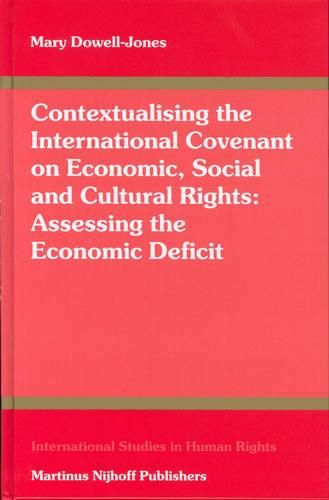Readings Newsletter
Become a Readings Member to make your shopping experience even easier.
Sign in or sign up for free!
You’re not far away from qualifying for FREE standard shipping within Australia
You’ve qualified for FREE standard shipping within Australia
The cart is loading…






This work builds on existing studies of the International Covenant on Economic, Social and Cultural Rights by reviewing the challenges to implementation posed by the evolving global macroeconomic environment. The inter-disciplinary focus adopted highlights the limits to a purely legal approach to this instrument at both a theoretical and practical level: issues such as the justiciability debate and the difficulties which the Committee on Economic, Social and Cultural Rights have experienced in applying the ICESCR to States parties’ economic policy choices are reviewed from a macroeconomic perspective and it is argued that only once the economic de-contextualisation of this instrument has been addressed will the guarantees in the ICESCR be fully actualised. In this vein it is proposed that reform of the existing supervisory architecture to incorporate economic expertise would be a more positive step forward for the ICESCR than the adoption of the proposed optional protocol. This work is aimed at those working within the sphere of socio-economic rights as well as human rights specialists interested in the implications of global economic integration for the international human rights system as well as the possibility of new paradigms in international human rights methodology.
$9.00 standard shipping within Australia
FREE standard shipping within Australia for orders over $100.00
Express & International shipping calculated at checkout
This work builds on existing studies of the International Covenant on Economic, Social and Cultural Rights by reviewing the challenges to implementation posed by the evolving global macroeconomic environment. The inter-disciplinary focus adopted highlights the limits to a purely legal approach to this instrument at both a theoretical and practical level: issues such as the justiciability debate and the difficulties which the Committee on Economic, Social and Cultural Rights have experienced in applying the ICESCR to States parties’ economic policy choices are reviewed from a macroeconomic perspective and it is argued that only once the economic de-contextualisation of this instrument has been addressed will the guarantees in the ICESCR be fully actualised. In this vein it is proposed that reform of the existing supervisory architecture to incorporate economic expertise would be a more positive step forward for the ICESCR than the adoption of the proposed optional protocol. This work is aimed at those working within the sphere of socio-economic rights as well as human rights specialists interested in the implications of global economic integration for the international human rights system as well as the possibility of new paradigms in international human rights methodology.